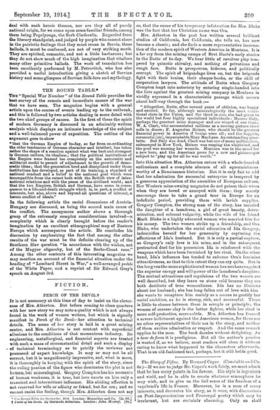LEGENDS FROM SERVLA..*
Im has been said that if a man wants to be admired by the peasants of Servia he must prove himself a good fighter, a good drinker, or, above all, a good singer. The Southern Slays enjoy the possession of an unusually rich store of popular ballads and lyrics; and the professional bards, going from village to village chanting their rude decasyllabics to the accom- paniment of the single-stringed goussle, did much to keep the national spirit alive through the centuries of Turkish domina- tion. Though the ballads translated here date mainly from the fourteenth century, new ones are continuously being composed, and doubtless the Servian victories over the Austrians are to-day being celebrated in improvised verses through hundreds of villages. M. Miyatovich mentions in the preface which he has written to this volume the amusing fact that when in 1873, as Minister of Finance, he was defeated in the Budget debate in the Skoupshtina the news was being recited to the people in blank verse by the same evening. These ballads are unknown in England, though as a mat ter of fact a oollection of them was translated and published by Sir John Bowring as long ago as 1827. They are for the most part concerned with the glories of the Servian Empire before its destruction in 1389 at the battle of Kossovo, and centre especially round the figure of the national hero Kralyevitch (King's Son) Marko with his wonderful horse ' Sharatz '—" a dragon mounted upon a dragon." Marko is an historical figure of the fourteenth century (only last May the present writer came across a young Dalmatian who claimed to be descended from him), but a glamour of the miraculous covers his exploits. He "throws his heavy mace aloft as high as the clouds, and catches it again in his right hand, without dismounting from his trusty courser Sharatz,'" and Sharatz ' bounds fiercely forward, " leaping to the height of three lances in the air, and covering the length of four lances at each bound." Moreover, Marko is commonly believed to be still alive, and his inspiring presence helped the Servians to win many of their victories during the recent Balkan Wars. All of the ballads do not • Hero-1'ates and Legends of the Serbians. By Woisdav M. Petrovitch. London : George G. Harrap and Co. [10s. 6d. net.1 deal with such heroic themes, nor are they all of purely national origin, for we come upon some familiar friends, among them being Pepelyouga, the Serb Cinderella. Regarded from Ile literary standpoint, and judged by people who cannot share in the patriotic feelings that they must rouse in Servia, these ballads, it must be confessed, are not of very striking merit. They are spirited, romantic, and not a little barbarous ; but they do not show much of the high imagination that vitalizes many other primitive ballads. The work of translation has been excellently performed by M. Petrovitch, who has also provided a useful introduction giving a sketch of Servian history and some glimpses of Servian folk-lore and mythology.



































 Previous page
Previous page